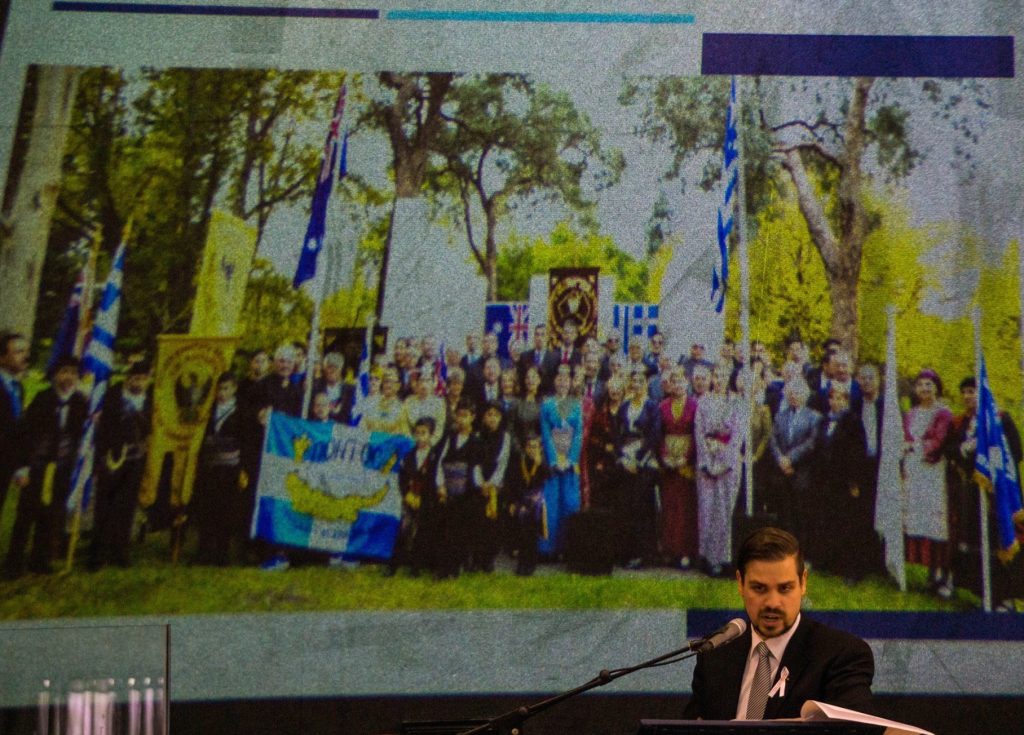The Pontian Greek genocide will be commemorated this year in Sydney with a keynote speaking event on Friday, May 19 at the Hermes Lounge in Kogarah from 7pm.
Dr Themistocles Kritikakos will be the keynote speaker on the night and will speak on the impact memories of violence and traumatic experiences have on Armenians, Greeks and Assyrians across generations in Australia.
Ahead of the event, The Greek Herald sat down to speak with Dr Kritikakos and this is what he had to say.

How did you become interested in the topic of genocides?
I became interested in genocide studies, learning about the Holocaust and the Armenian genocide in high school. As a child I heard stories about the experiences of my maternal grandparents, who were from Livisi and Kalamaki in southwestern Asia Minor. It was difficult to find details about their experiences. They had lost members of their family. They were uprooted when they were children and settled in Kastellorizo.
When I started studying the history of the Armenian Genocide, the Greeks and Assyrians were usually left out of the discourse or not mentioned in the same way. The victims of Armenians, Greeks and Assyrians in the late Ottoman Empire were about 3 million, among whom were over 750,000 Greeks, from 1914 to 1923.
Research on the Greeks and Assyrians was just beginning in the field of genocide scholars in English. I had also followed the efforts for genocide recognition and cooperation between Armenians, Greeks and Assyrians in Australia. They achieved recognition of the genocide by the Parliament of South Australia in 2009 and by the Parliament of New South Wales in 2013.
The way stories are shared within families and the silence that exists about traumatic events are of interest to me. The experiences of the Pontic Greeks were known in the Greek community, but I was also interested in the experiences of the Greeks of Asia Minor and Eastern Thrace.
How have subsequent generations been affected by their ancestors’ traumatic past in the late Ottoman Empire?
During my PhD, I conducted over 70 interviews with Greeks and Assyrians in Australia because their experiences remained unknown. The Greek interviewees were descendants of the survivors. They were originally from Asia Minor, Pontus and Eastern Thrace. The traumas of the Greek survivors of the late Ottoman Empire have been transmitted to their descendants living in modern Australia. Some members of the next generation try to understand their ancestors’ traumas by asking relatives questions and finding information to piece together their stories. They feel an obligation to resolve the past traumas they inherited.
Sometimes, survivors spoke about the past. But usually the survivors did not speak about the events they lived through because of the traumas they suffered. Forgetting the past, the first generation tried to deal with the traumas, survive and protect their children. The second generation usually did not ask questions. The survivors and in some cases their children lived through World War II and the Civil War. With the migration, the events were forgotten and they tried to adapt to their new country.
Because of the “double wall of silence,” the traumas of the first generation were transmitted from one generation to the next. Subsequent generations deal with the unresolved traumas of their ancestors. It was the third generation that wanted and sought to learn more about the violence and uprooting of their ancestors.

What has changed in genocide recognition efforts among Armenians, Greeks, and Assyrians since you began your research in 2017?
Efforts to recognise the genocide have grown stronger since I began my research. Since 2020, the Joint Justice Initiative between Armenians, Greeks and Assyrians has formalised the cooperation. Armenians, Greeks and Assyrians have developed a common memory. Armenians have worked very hard for genocide recognition for several decades. For a time they were active on recognising their own experiences, but they have been working more closely with the Greeks and Assyrians in recent years, and the term genocide is commonly associated with all three groups.
Armenians face a similar experience as that in the late Ottoman Empire today in Artsakh. The Assyrians still remain without a state. Indigenous of Mesopotamia, many Assyrians have settled in Australia and Assyrian trauma continues in Iraq.
You hear more about the genocide in the Greek community especially in Melbourne and Sydney. There is more knowledge about the experiences of the Greeks, which includes victims from Asia Minor, Pontus, Eastern Thrace and even the Levant. The issue of genocide is beginning to become more widely known worldwide, with an emphasis not only on the Armenians, but also on the Greeks and Assyrians. A common experience of genocide is presented, which has now led to efforts for recognition by the Australian government.
What does Australia have to do with these events?
The Armenian Genocide began on 24 April 1915, the day before the Australian and New Zealand Army Corps (ANZAC) landed on Gallipoli. A week before the landing, 32,000 Greeks of Gallipoli were uprooted by “Neotourkoi” and none remained after the end of the First World War.
Australians provided humanitarian aid from 1915 to the 1930s to survivors and have been honored at Greek, Armenian and Assyrian commemorations in Australia. They are part of Australian, Greek and transnational history. Australia’s modern identity is based on the history of the Gallipoli campaign during World War I and the reconciliation with Turkey. The shared history between Australia and Turkey does not take into account the Australian relationship with Armenian, Greek and Assyrian survivors.
Australian humanitarianism is the link that connects Armenians, Greeks and Assyrians to modern Australia. The descendants of the survivors believe that their ancestors should be part of Australian historical memory. Australian politicians have supported the genocide recognition efforts of the three communities for this reason.


